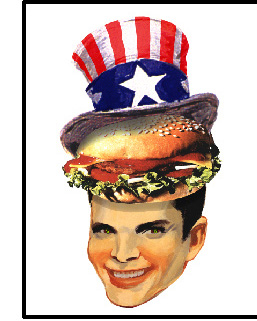
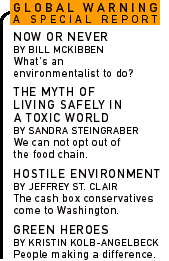
|
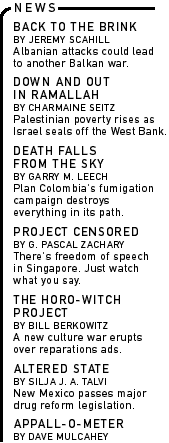
|
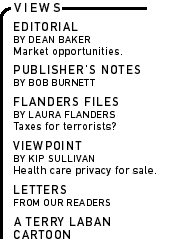
|
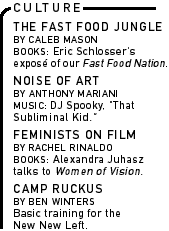
|
| |
|
|
|
Fast Food Nation The manufacture and consumption of fast food serves as a potent metaphor in many areas of social criticism--talk of "McJobs," "McHouses" and now "McWorld" is commonplace. But to Eric Schlosser, author of Fast Food Nation, fast food is more than just a metaphor, and its world-shaping power is more than merely symbolic. The staggering sums we spend on fast food should be enough, by themselves, to warrant book-length treatment. Fast food, we learn, is the object of more consumer spending ($110 billion last year) than higher education, computers or cars. Or, if we're interested in its cultural significance, we spend more on fast food than on "movies, books, magazines, newspapers, videos and recorded music--combined." The fast food industry has pioneered and ruthlessly enforced the regime of consolidation, homogenization and standardization--in both production and consumption--that has swept over our economy in the past 30 years. The companies that control the industry have exerted their enormous influence--purchasing power, economies of scale, lobbying clout--to help transform American agricultural production; thwart unionization and living-wage movements in the restaurant industry and the rest of the service sector; propel and accelerate the spread of suburban sprawl; and, perhaps most visibly, redraw the physical contours of Americans themselves, transmitting obesity like a communicable plague--a plague that is now spreading to all four corners of the earth. The public health threat of fast food is even more serious: Many deadly new pathogens have arisen and spread as a direct result of changes in cattle and poultry growing, meatpacking and food preparation spurred by the rise of fast food. This is a frightening vision. Schlosser aims to do what the best social criticism has
Schlosser is a reporter, not an economist, historian or sociologist, so you will not find here as explicit a reliance on social and economic theory as in some previous work with which Fast Food Nation might otherwise be compared: Stanley Aronowitz on working-class culture, Barbara Garson on the modern workplace, Jane Jacobs on cities or Doug Henwood on Wall Street. But Schlosser's book can stand alongside these influential studies as a well-researched, illuminating and angry examination of widespread cultural and economic practices that have a profound daily impact on millions of lives. And Schlosser is not aiming at an academic audience: This is a book for all of us--for a nation that averages three burgers and four orders of fries per capita per week, a nation where every month 90 percent of our children eat at a McDonald's. A lack of critical reflection is the grease lubricating exploitation, and fast food thrives on unreflectiveness: The vast majority of fast food visits, according to the industry's own data, are made "on impulse." Everyone knows that fast food jobs suck. They're greasy, low-paid, short-term, unskilled and without benefits, and among teen-agers, who fill nearly all of them, they're not even cool. The cumulative impact of the fast food economy is stark: The restaurant industry is the largest private employer in the United States, and the great majority of these jobs--3.5 million of them--are in fast food. These workers comprise "by far the largest group of minimum wage earners." McDonald's hires 1 million people a year, "more than any other American organization, public or private"; one in eight American workers have worked at McDonald's. In addition to its restaurants, McDonald's exerts near-total control over the production of commodities of which it is among the largest buyers: beef, potatoes, pork and poultry. And McDonald's competitors, fast food chains like Burger King and KFC, ape one another's tactics with great precision. Fast food workers rarely have benefits of any sort, and typically turn over at several hundred percent each year. And they are never, ever unionized. In addition to being low-paid and transient, fast food work is dangerous: the rate of injury in fast food jobs is among the highest of any job category. But if that weren't bad enough, fast food workers are now more likely to be murdered on the job (four to five per month) than are police, and though precise statistics are unavailable, Schlosser says they're probably more likely to be the victims of violent crime on the job than any other class of workers. Led by the fast food chains, the restaurant industry has spent vast sums to oppose the minimum wage (yes, the minimum wage itself--not just hikes in it), federal protections for union organ-izing, federal food safety regulations and enforcement, and OSHA workplace safety standards. It was among the first industries to apply the principles of Taylorism--standardizing and simplifying each stage of production to eliminate the need for skilled workers--to every aspect of its business, aspiring to a "zero-training" work force of interchangeable and disposable part-timers. Workers in fast food restaurants may be more likely to be murdered at work, but the nation's most dangerous job also owes its current scope, structure and working conditions to fast food: The meatpacking industry has been thoroughly transformed by the vast buying power and cost-cutting demands of the burger regime. In the past 30 years it has recrudesced from the well-paid, unionized profession of the '60s--the product of decades of worker activism and progressive government regulation, building on Upton Sinclair's revelatory The Jungle--into yet another fin-de-si�cle recreation of the 1890s: an extremely low-paid, dangerous and filthy job filled by desperate, powerless immigrants without unions, health care or job security. Every aspect of cattle raising, from field to tray, is dictated by the demand of the fast food chains for ever-cheaper flesh. Schlosser vividly revisits this oft-told story: The belts on the killing floor speed up, more tendons and ligaments strain and tear, more fingers are lost, and more (1 in 5) cow intestines are punctured, spraying feces over the entire carcass. Since hamburger meat is made by combining cuts from dozens of animals, fecal contamination of commercial ground beef is almost certain. And that feces is increasingly likely to carry nasty, rapidly mutating versions of the E. coli bacterium, which thrives in the nation's feedlots--vast gulags where thousands of cattle wait to die, penned shoulder to shoulder, hip deep in their own feces, and fed with whatever's cheapest: rotten grain, ground-up hogs, even newspapers used to line the cages in poultry houses. As Schlosser puts it plainly, "there is shit in the meat. ... Anyone who brings raw ground beef into his or her kitchen today must regard it as a potential biohazard." And yet as inspections lag and infections soar, the industry has convinced several state legislatures to enact severely punitive revisions to libel codes to prevent people from "slandering" its product. Fast Food Nation opens and closes with an existential dilemma: "Pull open the glass door, walk inside ... study the backlit color photographs above the counter." And then? Do you place your order and stuff your face? Or do you turn around and walk out? Every encounter with fast food, Schlosser suggests, is a Sartrean moment of self-creation--literally so, since what we choose to eat becomes the very stuff of our bodies and brains. His solution to the multifold crises of the fast food plague is a simple choice: a mass "refusal to buy," a potential boycott he likens to the spontaneous eruptions of civil disobedience that transformed Eastern Europe in the late '80s. It's true of course that we all can, one at a time or en masse, make the decision to forego fast food. We can do so for any number of reasons: concerns about health, the environment, animal suffering, workplace justice or simple aesthetics. Schlosser supplies ample fodder for such deliberations. But it's also true that people make their choices within particular confluences of circumstances--historical, political, economic, cultural--that present them with a set of variously realizable options. Schlosser should have given us a chapter exploring the ways in which the basic physical and social environment Americans occupy serves to constrain and direct our choices. He gestures at such an analysis throughout the book, but he never approaches it directly, which weakens his too-brief chapter on possible solutions to the fast food crisis. Exhortations to virtue have their place, but public health reports on dietary habits and obesity unanimously agree that, as one recent Health and Human Services Department report puts it, "the focus on changing the behavior of individuals" as a response to obesity and diet-related diseases is "woefully inadequate." Solutions should concentrate instead on broad environmental and structural conditions, and the material is available in Schlosser's book for such an analysis. In particular, Schlosser clearly details the parasitism of fast food on the automobile: The rise of fast food restaurants coincided precisely with the massive federal road-building projects of the '50s, and continued with the car-driven suburban expansions of the past 30 years. (Fast food chains, he says, view highways and cars the way predators view prey.) He also observes that McDonald's is the world's largest purchaser of commercial spy-satellite photos, which it uses to predict the direction of incipient sprawl. It then selects cheap, exurban sites for its new stores, and these openings fuel a self-fulfilling cycle in which other chain stores and developers follow, all the while sucking up massive public subsidies for infrastructure. But Schlosser does not make the link between breaking the addiction to fast food and breaking the addiction to cars. This is an unfortunate omission, given the extent to which public health experts, some of whom he cites, have stressed this connection. All those "impulse buys" are made by people driving by in their cars; people who sit in traffic for two or more hours a day are much more likely--regardless of individual virtue, taste or free will--to eat at the roadside fast food joints that beckon like sirens from every off-ramp than people who have some other way to commute. Just as car-only suburbanization has multiple ripple effects, so too do simple and inexpensive infrastructural offerings: bike lanes and bike paths; tax incentives for urban "infill" developments of new residential, office and manufacturing space; and, most important of all, shifting federal transportation spending away from roads and toward mass transit. As Schlosser points out--and as writers like Clay McShane have described in detail--mass transit in this country was systematically rooted out by auto, tire, oil and cement companies; the "inherent superiority" of the car, and the "innate preference" of Americans for driving, are carefully constructed myths. Prophesying the end of the car culture is no more utopian than prophesying the end of the fast food culture, and Schlosser should have done so. But that task can await other writers. As it stands, Fast Food
Nation is quite up to its stated goal: forcing us to stop for
a moment and reflect on our own actions. If the view is unpleasant,
and it is, we can at least take heart in the knowledge that there
are alternatives to fast food, alternatives close at hand, easy
to envision and easy to enact. Structural change comes from mass
social movements, and here perhaps is one waiting to be born, emerging
like Dionysus--the god of aesthetically pleasing sustenance--from
his father's thigh. It's an American thigh, of course--pendulous,
quivering and mottled with cellulite--but ready to deliver, one
heaving contraction of nausea at a time. Caleb Mason teaches philosophy at Stephen F. Austin State University in Nacogdoches, Texas. His e-mail address is cmason@sfasu.edu.
|


